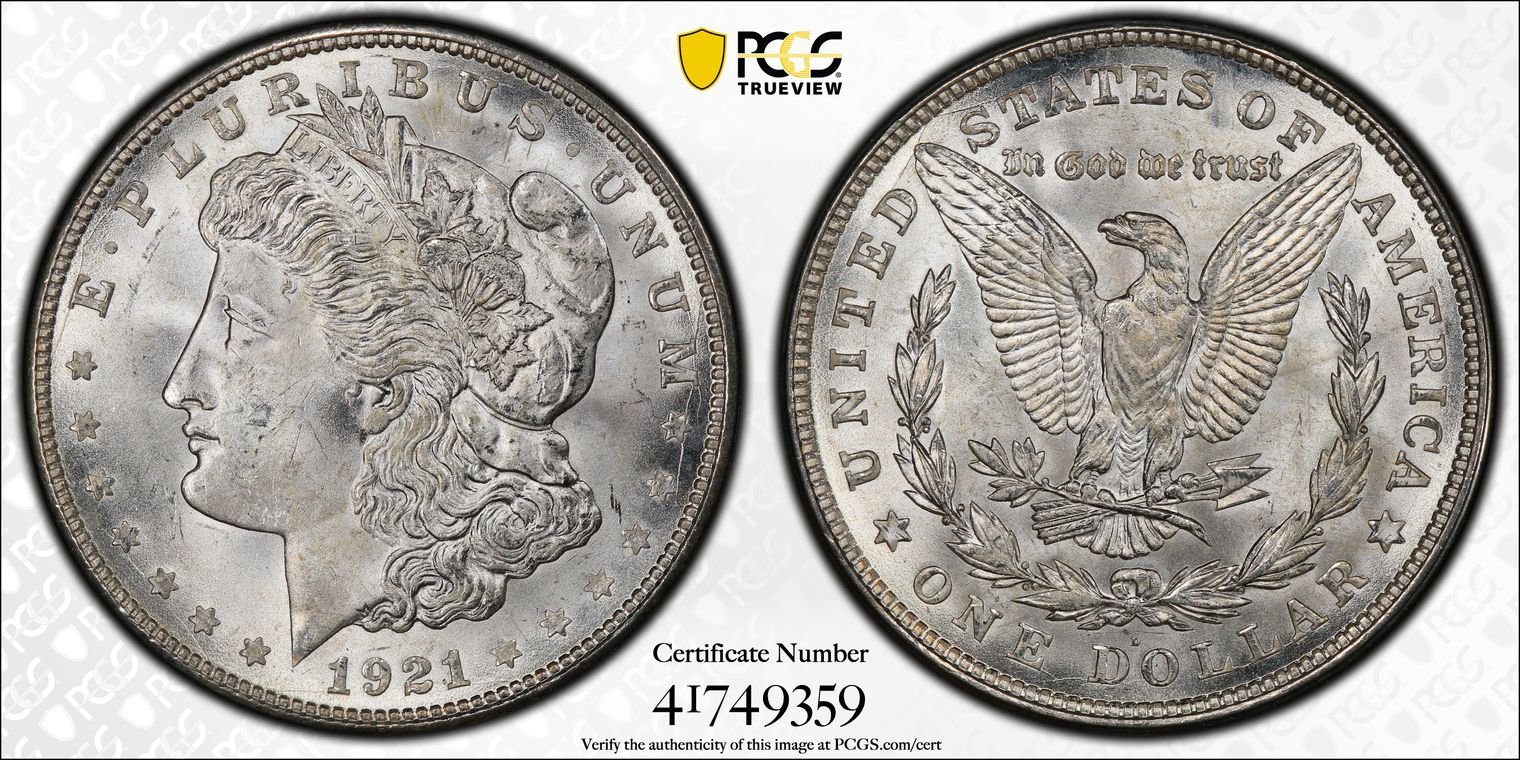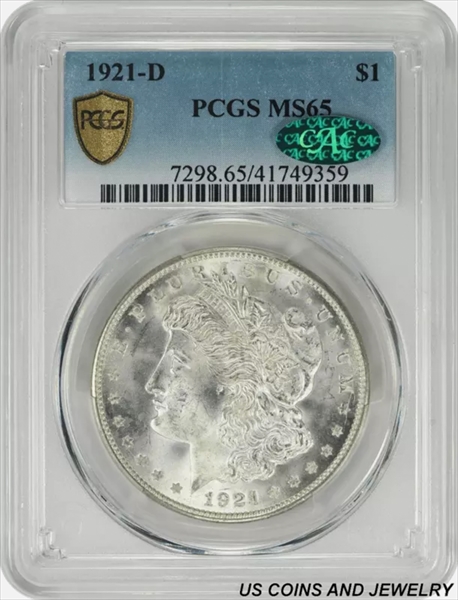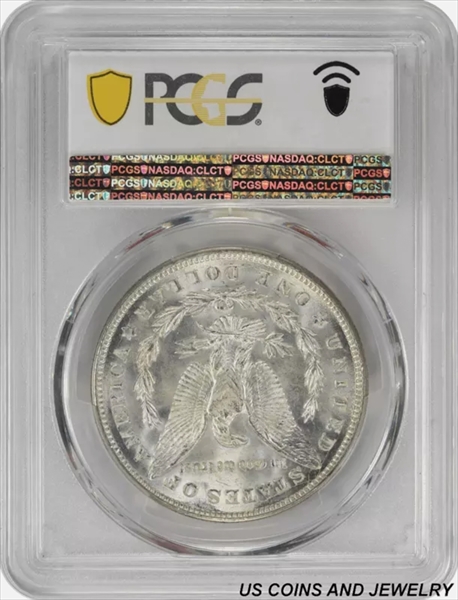1921-D $1 MS65 认证号41749359, PCGS号7298
拥有者评论
专家评论
Jaime Hernandez
1921 is the last year in which the Mint struck Morgan Silver Dollars. The coins were struck from the large and famous Nevada Silver discovery, the Comstock Lode.
The 1921-D Morgan Dollar is also the only Morgan Silver Dollar that was struck at the Denver Mint. Despite being the last year of the Morgan Dollar it is also the only year in which you can obtain an example from each three different Mints. Which are the 1921 Philadephia, Denver and San Francisco Morgan Dollars.
Q. David Bowers
The following narrative, with minor editing, is from my "Silver Dollars & Trade Dollars of the United States: A Complete Encyclopedia" (Wolfeboro, NH: Bowers and Merena Galleries, Inc., 1993).Commentary: The 1921-D Morgan dollar is distinctive as the only Denver Mint coin of this design. A set of Morgan dollars from the different mints included Philadelphia, Carson City, New Orleans, San Francisco, and, now, Denver. The D mintmark is tiny on all issues; Micro D. Some coins were struck from die(s) with the D shallowly impressed; the mintmark is scarcely visible.
In keeping with Philadelphia Mint coins, 1921-D dollars were struck from redesigned shallow-relief dies.
Hoard coins: Vast quantities of Mint State 1921-D dollars were released in the 1950s and early 1960s. The issue was considered common, and most dealers did not desire to buy them. Today, original mintsealed bags are few and far between, but the coins themselves are common. However, far fewer Mint State 1921-D dollars exist than do 1921 Philadelphia Issues.
Circulated grades: In worn grades, 1921-D dollars are exceedingly common. AU coins are difficult to distinguish from MS-60. An estimated 1.5 to three million circulated pieces survive.
Mint State grades: The typical Mint State coin is in lower grades such as MS-60, 61, or 62, and is an average strike, but some are well struck. As the dies were in shallow relief, a sharp strike is not as distinctive as one of the earlier 1878-1904 era. The surfaces are often frosty and lustrous, a point in their favor. As is the case with 1921 Philadelphia Mint Morgan dollars, a certified 1921-D is apt to have a poor aesthetic appearance.
I suggest these estimates: MS-60 to 62, 750,000 to 1,500,000; MS-63, 200,000 to 400,000; MS-64, 50,000 to 100,000; MS-65 or better (per current interpretations), 10,000 to 20,000.
Prooflike coins: What the certification services call PL coins are rare, unlike their Philadelphia Mint counterparts. Semi-prooflike pieces are occasionally seen; these sometimes have frosted designs. So called DMPL coins are scarer than PLs. Read what I have to say under 1921 Prooflike coins; the same thoughts apply here.
Engraved field pieces: See extensive commentaries by Norman M. Davis and Walter H. Breen under Additional Information below, for data concerning 1921-D dollars engraved in the field, a typical inscription being 9TH DOLLAR RELEASED FROM 1ST 100/ EVER COINED AT DENVER MINT / THOMAS ANNEAR, SUPT.
Varieties
REDESIGNED DIES: SHALLOW RELIEF
Business strikes:
1-2. 16 Berries in reverse wreath, Micro D:Breen-5709; Raised round dot in field: Breen-5710, many dot sizes (see VAM, p. 125). VAM-4 has multiple dots. Some 1921-Ds have the S in TRUST filled in. Many minor positional varieties. All are Van Allen and Mallis Reverse D-2.
Dies prepared: Obverse: At least 30; Reverse: At least 30. The true number is probably over 100 die pairs.
Business strike mintage: 20,345,000
Estimated quantity melted: Many millions under the Silver Act of 1942 and later melts.
Availability of prooflike coins: Prooflike coins are scarce, but because they are usually unattractive there has been very little demand for them. So-called DMPL coins are scarcer yet.
Characteristics of striking: Better struck than Philadelphia or San Francisco dollars of this date, but usually lightly struck, with graininess on the cheek of Miss Liberty.
Known hoards of Mint State coins: More or less continuously distributed by the Treasury during the 1950s and early 1960s.
Commentary
Only Denver Mint Morgan dollar; very tiny mintmark.
Additional Information
Denver and San Francisco Begin Coinage The Numismatist, June 1921, printed this article:
"Other Mints to Coin Silver Dollars: The coinage of silver dollars during February and March was done exclusively at the Philadelphia Mint. During April the Denver Mint began striking the large silver discs, and it is stated that the San Francisco Mint is about ready also to begin work on the coinage of that denomination, according to a press dispatch from Denver published in the Colorado Springs Gazette on April 20, as follows:
" 'The first American silver dollars ever manufactured in Denver will be coined at the local mint beginning next Thursday, it was announced today, following the receipt of more than one million ounces of silver. The silver has been received in small amounts over a period of 30 days from western mining camps. Silver dollars were last stamped by the Philadelphia Mint in 1904, until the resumption of their mintage in that city last month, officials said.
" 'The manufacture of Denver's first silver dollars will continue several months, and the work will be handled by a double shift of employees, working day and night. Mint employees have been busy for two weeks installing new machinery in preparation for the manufacture of dollars. Special dies are being made under supervision of experts from Washington.
" 'The new dollars are to be made under a provision of the Pittman Act to replace silver dollars melted during the war and shipped in bars to India. All mints in the country will make silver dollars until 208 million have been made.
" 'The San Francisco Mint will begin making dollars within 30 days, it was said. Hundreds of thousands of dollars' worth of silver has been hauled through Denver's streets in unpretentious wagons during the last few days, unknown to the thousands of people by whom it passed.' "
The First 1921-D Dollars (Davis)
In COINage magazine, July 1974, Norman M. Davis's article, "The Mysterious Missing Silver Dollars," appeared, and told of the first 100 1921-D Morgan dollars struck. The article is reprinted here (with permission from the publisher):
"This story remained hidden from the numismatic fraternity for over 50 years, for the Engraving Depts.' draft was omitted from the final version of the Director's 1921 Annual Report.
"On April 25, [Thomas] Annear! wired to Mint Director Baker, 'Please have forwarded thirty pairs silver dollar dies.' This must have been done almost immediately, for on Thursday, April 28, Annear sent this message to Baker:
" 'Expect to start presses on silver dollars Monday. Have not yet received tubes for weighing machines from Philadelphia." Expected here tomorrow.'
"This gives us a starting date for our numismatic detection: Monday, May 2, is the earliest possible date for minting of Denver's first dollars. Baker sent a telegram on May 3, asking Annear for some of the early coins. Annear's letter of the next day is one of our most important bits of evidence in the mystery: 'I am sending you two of the first silver dollars made at this institution as per the request in your telegram of the 3rd instant.'
"On May 12, Baker would respond, 'I have to acknowledge receipt of your letter of May 4th enclosing two of the first silver dollars made at the Denver Mint. I am enclosing herewith $2.00 in payment for the same, and assure you of my appreciation of your forwarding them to me.'
"Since the coins were sent with the letter, we now also have the latest possible date for the minting of Denver's first silver dollars. Now, was the day Monday, May 2; Tuesday, May 3; or Wednesday, May 4? I found three lines of reasoning usable, and all three indicate the same day.
"First, Annear's May 5 telegram to Baker: 'Fifty thousand dollars will be delivered tomorrow, first delivery.'
"Annear could have no reason to specify which mail delivery was bringing coins. He must have been stating that this was the first delivery of Denver dollars. If the mint could turn out 100,000 pieces per day, 50,000 represent the work of less than one normal day. It's logical to expect a relatively small first-day total due to needs for last-minute adjustments to machinery and procedures. Also, it would take part of another day to bag the coins and prepare to ship them.
"Second, Annear wired to Mint Director Baker on May 18-a Wednesday-that he had delivered 400,000 dollars for the week ending that day. He reported another shipment May 25. Why end your reporting week on Wednesday? This arrangement makes sense only if the first production week began on Thursday-or on a Wednesday with low production.
"Finally, Annear sent Baker two of the first coins made. If minting had begun on Monday, May 2, the day's coins almost certainly would be bagged before Annear learned that Baker wanted specimens. The same is true for Tuesday, May 3.
"Only if Denver's first 100 silver dollars were struck late in the morning of Wednesday, May 4, does all the evidence fit perfectly .... And the day passed into history.
"Thomas Annear probably put aside the remaining 98 of the first 100 pieces. He messaged to Baker on Tuesday, May 17, to report receipt of 'numerous request of banks and individuals' for new dollars. Could he release coins directly to the public? The answer evidently was that he could.
"So he had an engraver (probably from the mint staff) add three lines of printing, curved to follow the rim, in the field at left of the Liberty head. The words begin with a number and continue: -TH DOLLAR RELEASED FROM 1ST 100 EVER COINED AT DENVER MINT, THOMAS ANNEAR SUPT.
"On No. 12 the L of RELEASED was started as an E. The coin's present owner suggests that by this time the engraver was 'gettin' a little tired.'
"What happened to these first 100 dollars?
"The State Historical Society of Colorado holds coin no. 1, according to Michael A. Sievers, the Society's Registrar, Material Culture. 'According to our records, the Denver Mint coined its first silver dollars on May 5, 1921 at 9 a.m.,' Sievers wrote me. As we now know, the actual date was May 4.
"What did occur on Thursday, May 5, must have been Mint Director Baker's presentation of the coin-but let Sievers tell it: ' ... and the first coin was apparently presented to the United States Senator from Colorado, L.C. Phipps. Senator Phipps in turn presented it to the State Historical Society of Colorado on May 11, 1921.' This coin, Sievers added, 'does not contain any extraordinary engraving indicative of its significance.'
"The next 11 pieces are mentioned to Annear's May 22, letter to a Mr. Cowbell: 'The ten silver dollars purchased by you from the mint were from the first hundred ever coined in this institution. At the request of the Director of the Mint I sent two silver dollars to Washington, which I understand were presented to the United States senators from this state, who in turn presented one to the School of Mines, Golden, and one to the Colorado State Historical Society. Yours were the next ten released.'
"Either Annear was wrong or someone later removed no.
2. Geraldine D. Bariani, Reference Librarian, wrote to me that the Colorado School of Mines holds no such coin.
'''We have searched all our records, called the various offices which were concerned or might have been connected with the coins and we can find nothing,' she reported. She and her staff searched the Golden Transcript, but found 'no statements in this paper about the Presentation pieces.'
"Coins no. 3-12 were lots 1040-1049 in B. Max Mehl's Dec. 18, 1923, auction catalogue, which printed Annear's letter to Cowell.
"To make matters more mysterious, at least 50 of the first 100 coins (besides no. 1 and 2) probably are not engraved.
'''I have heard that-and this is, of course, hearsay,' says the owner of nos. 6 and 12, 'the highest number that has been seen is no. 50. And whether there are any more beyond that, no one really knows. Or a no. 50 has been seen. I don't know of any others in between 12 and 50.'
"So most of the coins probably can be identified only by letters or other documents which authenticate them as from the first 100. And for many of the coins, authentication may be forever impossible.
"The engraved dollars are generally unknown, comments a spokesman for the Smithsonian Institution's Numismatics Division. He agrees that the work must have been done on Annear's own authority. The National Collection itself lacks a specimen of an engraved coin from the first 100, he says.
"1. Annear (Denver Mint) to Mint Director Baker (Washington), to Sen. Phipps, to State Historical Society, Denver, all May 1921. No engraving. Now held by State Historical Society.
"2. Annear to Baker, May 1921. Reportedly to other Colorado Senator and from him to Colorado School of Mines, but unknown there. Whereabouts unknown. No engraving.
"3-12. Annear to Cowell, May 1921. Cowell to Mehl for auction, 1923. Whereabouts unknown, except as noted below.
"6. Whereabouts unknown 1923 to late 1950s, when owned by Robert Friedberg. Now owned by private collector, Washington, D.C. Last sales record, $350.
"8. Whereabouts unknown 1923 to 1935, when found in circulation. At last report (1973), owned by J. Cecil Woodward, Alabama.
"9. Whereabouts unknown 1923 to 1969, when owned by Robert E. Ladum, Oregon.
"12. Whereabouts unknown 1923 to 1969, when owned by Tom McAfee. Whereabouts unknown 1969 to 1973, when owned by dealer in Florida, and sold to present owner. Now owned by private collector, Washington, D.C. Last sales record, $400.
"1349. Whereabouts unknown. May lack engraving. "50. Whereabouts unknown.
"51-100. Whereabouts unknown. May lack engraving."
The First 1921-D Dollars (Breen)
For inclusion in the present book, Walter H. Breen contributed the following (which has been edited to delete items redundant from the Norman M. Davis article just quoted). However, Breen believes that the engraving was done by or for numismatist C.W. Cowell, which, if true, removes them from the category of official pieces, but does not lessen their historical value:
"The pieces engraved in obverse field 9TH [etc.] DOLLAR RELEASED FROM 1ST 100/ EVER COINED AT DENVER MINT / THOMAS ANNEAR, SUPT. have become controversial. The engraving was apparently not done at the Mint, but privately by or for C.W. Cowell (nos. 3-12 below) .. .. [Cowell letter quoted here.]
"The actual # 1 and #2 specimens were evidently not engraved. Pedigrees of Nos. 3-12 should all begin "Thomas Annear, C.W. Cowell, Mehl 12/18/23:1040 [through 1049]". The roster is as nearly complete as possible:
"1. Colorado School of Mines, Golden. No record of accession or disappearance.
"2. Stolen from the Colorado Historical Society, 1980. Not recovered.
"3. Annear, Cowell, Mehl 12/18/23:1040, ... private collection, Steve Tebo, 1982-. ANACS certificate E-6064-V.
"4. Annear, Cowell, ... Frank Rinaldi, ex a bingo game, 1989.
"5. Annear, Cowell, ... ? Uncertain. (Later appeared as Lot 1423 in the Miller Collection Sale, Bowers and Merena, November 1992.)
"6. Annear, Cowell, ... Robert Friedberg (bought before 1960), $350 to an East Coast private collection, Superior's sale of January 1986, $5,500.
"7. Annear, Cowell, ...? Uncertain.
"8. Annear, Cowell, ...? Found in circulation, Tennessee, 1935, by J. Cecil Woodward.
"9. Annear, Cowell, ... Tidewater Coin Club auction (early 1960s), private collection, Robert E. Ladum (reported 1969).
"10. Annear, Cowell, ... Tidewater Coin Club auction (early 1960s), Charles Taliaferro.
"11. Annear, Cowell, ....? Uncertain.
"12. Annear, Cowell, .........Florida dealer Tom McAfee (1969), to owner of #6 (1973); offered with #6 in the Superior sale, reported to have been unsold.
"The above derive partly from Alan Herbert, "Denver Dollars Not Engraved at Mint," Numismatic News, 11/28/89, page 58."
Ron Guth
According to a notice in the June 1934 issue of The Numismatist (p. 416), collectors could still purchase Uncirculated 1921-D Morgan Dollars for "the face value of the coins and an amount sufficient to cover the mail charrges by first-class mail."
稀有性和存量估计 了解更多
| 所有评级 | 2035000 |
| 60或以上 | 150000 |
| 65或以上 | 6000 |
| 所有评级 | R-1.0 |
| 60或以上 | R-1.9 |
| 65或以上 | R-3.8 |
| 所有评级 | 94 / 117 TIE |
| 60或以上 | 75 / 117 TIE |
| 65或以上 | 77 / 117 |
| 所有评级 | 94 / 117 TIE |
| 60或以上 | 75 / 117 TIE |
| 65或以上 | 77 / 117 |
























